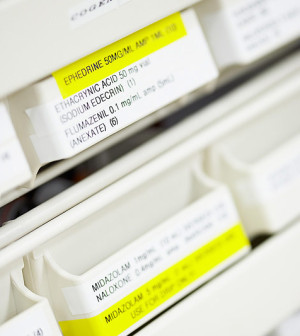- Could Your Grocery Store Meat Be Causing Recurring UTIs?
- Are You Making This Expensive Thermostat Error This Winter?
- Recognizing the Signs of Hypothyroidism
- 10 Strategies to Overcome Insomnia
- Could Artificial Sweeteners Be Aging the Brain Faster?
- Techniques for Soothing Your Nervous System
- Does the Water in Your House Smell Funny? Here’s Why
- Can a Daily Dose of Apple Cider Vinegar Actually Aid Weight Loss?
- 6 Health Beverages That Can Actually Spike Your Blood Sugar
- Treatment Options for Social Anxiety Disorder
Study Questions Link Between Antidepressants, Miscarriage


Some studies have found that women who use common antidepressants early in pregnancy face a raised risk of miscarriage, but new research suggests the link might be better explained by the depression, rather than the drugs that treat it.
Looking at records for more than 1.2 million pregnant women, researchers found that those prescribed selective serotonin reuptake inhibitors (SSRIs) in their first trimester were 27 percent more likely to have a miscarriage than women who weren’t on the drugs.
But a similar increase was also found among women who’d stopped using an SSRI three months to a year before becoming pregnant.
That suggests some other factor — possibly the depression itself — might explain the miscarriage link, the researchers suggested.
“We believe that these results clearly indicate that miscarriage is not associated with SSRIs, but with conditions associated with the use of SSRIs,” said lead researcher Dr. Jon Andersen, of Copenhagen University Hospital in Denmark.
Not everyone was convinced, though.
Dr. Adam Urato, a maternal-fetal medicine specialist at Tufts Medical Center in Boston, has studied the issue. He said the new research has limitations, including its reliance on prescription records because it’s impossible to know whether women actually took their medications.
“This kind of misclassification will bias the results toward the null, which just means that it makes the study more likely to say that the drugs are safe when they aren’t,” Urato said.
More important, Urato said, the findings should be seen in the wider context. A number of studies have linked SSRIs during pregnancy to a heightened risk of miscarriage, preterm birth, pregnancy complications such as pre-eclampsia, and developmental disorders such as autism later in a child’s life.
Those types of studies do not prove cause-and-effect. But Urato said there’s some biological evidence to back up a link: Animal research has shown that SSRI exposure during pregnancy can cause the same types of problems that have turned up in some human studies.
Plus, “we know that the serotonin system is crucial for the developing fetus. And SSRIs disrupt that system,” Urato said.
Serotonin is a chemical “messenger” that helps regulate mood, appetite, blood vessel dilation and other vital functions. SSRIs, which raise serotonin levels, have become the “first-line” drug against depression, and include drugs such as fluoxetine (Prozac), sertraline (Zoloft), citalopram (Celexa) and paroxetine (Paxil).
Andersen said one of the difficulties in studying whether SSRIs contribute to miscarriage is that it’s hard to know whether any negative effect is the result of the drugs, the underlying depression, or some other factor.
He added he believes that his study helps address that problem by including women who were recently on SSRIs, but stopped before becoming pregnant.
The findings, reported in the October issue of Obstetrics & Gynecology, are based on records for more than 1.2 million Danish women who were pregnant between 1997 and 2010.
Of nearly 23,000 women who had a prescription for an SSRI in the first 35 days of pregnancy, 12.6 percent had a miscarriage. That compared with just over 11 percent of women with no SSRI prescription.
When Andersen’s team considered factors such as maternal age and income, SSRI use was still tied to a 27 percent increase in miscarriage risk. But there was a similar increase among women who’d stopped an SSRI prescription at least three months before pregnancy.
Andersen pointed to possible explanations for the miscarriage risks. “Other studies have shown that people suffering from depression are more likely to abuse alcohol and smoke,” he said, “and it is possible that women [with] depression are less likely to follow the recommendation of folic acid supplementation before and during pregnancy.”
The researchers’ conclusions are “reasonable,” said Christina Chambers, director of the Center for the Promotion of Maternal Health and Infant Development at the University of California, San Diego.
And while other studies have tied SSRIs to pregnancy risks, those excess risks have been “modest,” Chambers noted.
“If there are risks, they seem to be fairly small,” she said.
So for any one woman, those potential risks would have to be weighed against the risks of stopping an SSRI, particularly for women with more severe depression, Chambers said.
Urato agreed that for some women, taking an SSRI during pregnancy might be the right move. “Am I saying no one should take these drugs? No,” he said.
But, Urato added, women should be told what the evidence is, so they can make an informed decision about whether to stick with their medication.
More information
The Organization of Teratology Information Specialists has more on medication safety during pregnancy.
Source: HealthDay
Copyright © 2026 HealthDay. All rights reserved.










